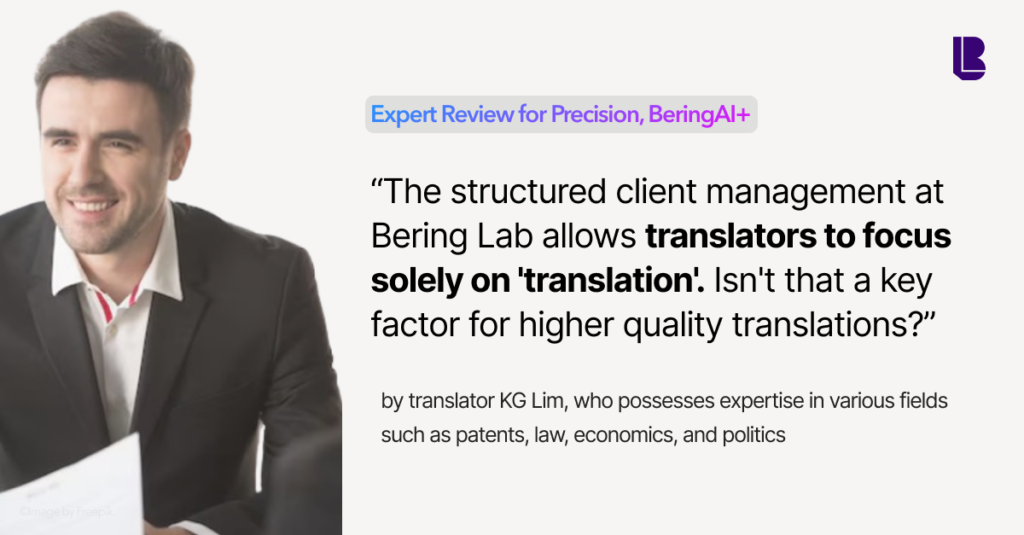“The structured client management at Bering Lab allows translators to focus solely on ‘translation’. Isn’t that a key factor for higher quality translations?😎“
Today, we are excited to introduce an interview with KG Lim, a translator at Bering Lab who has expertise in various fields such as patents, law, economics, and political science. KG Lim has studied law, economics, and political science in the United States and has extensive experience in translating legal documents for institutions like the Bank of Korea, Coupang, and major law firms. Let’s dive into KG’s story.
Q. Could you briefly introduce the type of work you are currently doing at Bering Lab?
A. Hello. I have been working as an in-house translator at Bering Lab for about five years now. I mainly handle contracts and court rulings, focusing on Korean to English translations.
Q. It seems you completed your undergraduate studies in the United States. Can you tell us about your experiences before joining Bering Lab?
A.I immigrated to the United States from Korea when I was five and pursued my studies in law there. After graduating from law school, I returned to Korea. Since I had a keen interest in writing, I took on translation work for legal documents for clients such as the Bank of Korea, Coupang, and Kim & Chang. I also wrote and proofread business documents like Founder’s letters required for IPOs, which gave me a wealth of experience and opportunities in business documentation.

Q. How did you end up working as a translator at Bering Lab?
A. Initially, I joined Bering Lab after receiving a call from CEO Moon Seong-Hyun. As I mentioned earlier, while I enjoy and excel at ‘translation’ and ‘writing’, I do not particularly like managing clients or handling administrative tasks related to project acquisition. (laughs) The structured project and client management at Bering Lab was a major advantage for me, allowing me to focus solely on my strength—’translation’. I am very satisfied with my work here.
Q. Do you have a specific procedure or method for your translation work?
A. I first make sure to fully understand the document itself. I review the terminology, correct any errors in the original text, and then begin translating. If I come across a concept or term that I don’t understand, I research and study it thoroughly. Understanding the original text clearly and accurately is crucial, so I focus heavily on this aspect. I actually prefer long documents because they provide more context and information, making it easier to see the big picture. While shorter sentences might be quicker to translate, they can lack context, making them more challenging. I always strive to ensure that the final translation is clear and accurately conveys the intended meaning to the reader.

Q. It’s evident that you pour a lot of passion into each document! Talking to you, it’s clear that you have a genuine passion for ‘translation’ and ‘writing’.
A. Yes, that’s right! I genuinely love learning languages and find the process of acquiring new languages fascinating. For example, due to the fundamental differences in language structure and culture between Korean and English, a direct 1:1 translation can often result in awkward or unintended meanings. Finding these differences between the source and target languages is a challenging yet rewarding task, much like solving a puzzle.
Q. Bering Lab utilizes the BeringAI translation tool to reduce human resource demands and allow translators to focus more on their expertise. How do you use BeringAI in your translation work?
A. Yes, I use it very frequently. There are certainly pros and cons to AI translation tools, but the advantages far outweigh the disadvantages in practical terms. Before AI translation tools, I had to manually look up terms in dictionaries and study the context thoroughly, which took much more time. Now, with AI handling the initial translation, I can quickly grasp both the context and meaning, significantly reducing the translation time. Of course, documents like court rulings in Korean, which can have lengthy sentences extending over four pages depending on the judge’s subjective style, are not suitable for translation tools. These are special cases, and I mostly use the tools for more standardized documents like contracts.
Q. Lastly, can you share with our users how Bering Lab’s services stand out from other translation services?
A. As I mentioned earlier, the structured client and project management at Bering Lab allows translators to focus solely on ‘translation’, which is a huge advantage. By minimizing administrative tasks such as project acquisition and client management, translators can concentrate fully on their translation work, ensuring higher quality outcomes. Moreover, Bering Lab has extensive experience and case studies with large enterprises and major law firms, which means our internal expertise and the standard of our deliverables are exceptionally high compared to other companies.
Bering Lab offers a variety of business and legal document translations through its BeringAI and BeringAI+ services, which combine high-performance AI with expert reviews to save resources and provide services that are three times faster and 40% cheaper than competitors.
Currently, over 130 law firms both domestically and internationally, along with various global corporations, actively use our services.
Experience the high-quality professional translation of Bering Lab, trusted by the nation’s top law firms, with documents directly reviewed by attorneys. Contact Bering Lab for more information.
🚀 Inquire about our more sophisticated and high-quality translation service, BeringAI+

